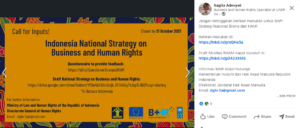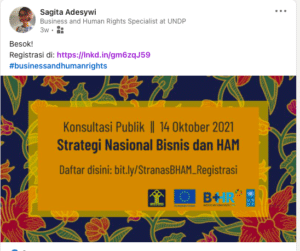Indonesia
On 26 September 2023 the National Strategy on Business and Human Rights was approved and signed by the President.
A breakdown of the NAP will be conducted when an English version is available.
Available NAPs
Indonesia: 1st NAP (2023-open)
Status
The National Strategy on Business and Human Rights was approved and signed by the President on 26 September 2023, and was officially published as Presidential Regulation Number 60 of 2023 concerning the National Strategy for Business and Human Rights. Official title of the document: Peraturan Presiden Nomor 60 Tahun 2023 Tentang Strategi Nasional Bisnis dan Hak Asasi Manusia.
Process
An unofficial ‘NAP’ prepared by the National Commission on Human Rights
In September 2014 the National Commission on Human Rights (KOMNAS HAM) and the Institute for Policy Research and Advocacy (ELSAM), an Indonesian prominent civil society organisation working on human rights, started a collaboration for the development of a ‘NAP’ with the agreement of several governmental institutions. In 2017, KOMNAS HAM published National human rights commission regulation No. 001 of 2017 concerning the adoption of the NAP on business and human rights. It referred to the policy paper (in Indonesian) that was prepared by KOMNAS HAM and ELSAM. This text has passed through a process of public consultation of stakeholders, including civil society organisation, the business sector, and government agencies. According to ELSAM (2020), the ‘NAP’ was not formalised and did not receive recognition from most of the Indonesian governmental institutions.
A National Strategy on Business and Human Rights
A National Focal Point on Business and Human Rights (within the Ministry of Law and Human Rights), supported by a multi-sectoral taskforce, was in charge of driving the national strategy development process. The Taskforce (GTN BHAM) is comprised of different ministries, CSOs (including ELSAM), business associations, academia, as well as UNDP representatives and is responsible for formulating, finalising and implementing the National Strategy.
The unofficial NAP prepared by the National Commission on Human Rights served as the background for the development of the National Strategy on Business and Human Rights. In 2018, the Ministry of Foreign Affair issued the General Guidelines on Business and Human Rights in Indonesia, which became a further basis for the development of the National Strategy.
On 25 November 2020, the Ministry of Law and Human Rights, with support from the European Union (EU) and the United Nations Development Programme (UNDP), launched a draft National Strategy on Business and Human Rights. This strategy ‘confirms the government’s commitment to protect the implementation of human rights within business operations.’
On 14 October 2021, the Ministry of Law and Human Rights, conducted a public consultation to obtain feedback on the draft National Strategy. An additional call for inputs via a Google docs form was available online until 21 October 2021.
In October 2021, UNDP Indonesia held a joint webinar with the regional governments of 33 of the 34 provinces of Indonesia. The webinar was co-hosted by the Ministry of Law and Human Rights. During the webinar, it was explained that this national strategy was designed as a complement to the National Action Plan on Human Rights.
#UNGP has provided a global standard to ensure human rights are respected in business operations at all levels. Respecting human rights is our shared responsibility @Kemenkumham_RI pic.twitter.com/I5mdKyiXUk
— UNDP Indonesia (@UNDPIndonesia) October 14, 2021
On 25 November 2020, the Ministry of Law and Human Rights, with support from the European Union (EU) and the United Nations Development Programme (UNDP), launched the draft National Strategy on Business and Human Rights. This strategy ‘confirms the government’s commitment to protect the implementation of human rights within business operations.’
The drafting of the National Strategy was also supported through various public consultations, involving a range of different stakeholders, including ministries/ institutions, international organisations, businesses, business associations and vulnerable groups of stakeholders. Publication of the draft allowed input from these groups of stakeholders.
The draft National Strategy on Business and Human Rights was approved and signed by the President on 26 September 2023, and was officially published as Presidential Regulation Number 60 of 2023 concerning the National Strategy for Business and Human Rights and covers the period 2023-2025.
In addition to the existing national Taskforce (comprising representatives of ministries/institutions, representatives of community institutions, business associations, and academics), a Regional Business and Human Rights Taskforce (GTD BHAM) was formed. This taskforce consists of provincial-level regional organisations and vertical agencies of ministries that carry out government affairs in the field of law and human rights, as well as non-governmental entities. This taskforce aims to support Regional Governments in their implementation of the Strategy.
Stakeholder Participation
The unofficial ‘NAP’ prepared by the National Commission on Human Rights
Consultations with civil society organisations were carried out to inform the substance of the unofficial ‘NAP’ on Business and Human Rights. UNICEF facilitated a consultation with children’s rights groups. Discussions were also held with legal academics. In addition, focus group discussions were held with several ministries/agencies that have authority in connection with business and human rights.
National Strategy on Business and Human Rights
In 2019, the Coordinating Ministry for Economic Affairs organised a focus group discussion to begin the NAP development process.
#indonesia #UNGP NAP process is underway with Coord. Ministry of Econ Affairs leading. Great job @UNDPIndonesia in facilitating discussions between CSOs, NHRI, biz asscs and ministries! @globalcompact @UNDPasiapac @liviosarandrea @hkaur0304 @VictoriaBMFS @C_Bahuet pic.twitter.com/VxNUNuImaS
— Sean C. Lees (@seanclees) 15. februar 2019
The publication of the Draft Strategy on Business and Human Rights allowed stakeholders, including inter-ministerial departments, private and state-owned enterprises, business associations, civil society organisations and networks of academics to provide feedback directly onto the draft.

National Baseline Assessment (NBA)
A National Baseline Assessment has not been conducted.
Follow-up, monitoring, reporting and review
According to the Head of UNDP Indonesia’s Democratic Governance and Poverty Reduction Unit, a cross-sectorial National Task Force will be responsible for awareness raising on the business and human rights agenda and ensuring that the National Strategy is indeed implemented by business actors.
Furthermore, a Subnational Task Force on Business and Human Rights operating under the direction of the Ministry of Law and Human Rights and involving regional offices from the 34 provinces will be responsible for helping businesses to undertake self-assessments on risks of human rights impacts caused by their operations throughout Indonesia’s provinces.
Stakeholders views and analysis on the NAP
Additional resources
Unofficial ‘NAP’
Foundation for International Human Rights Reporting Standards: Indonesia Launches National Action Plan on Business & Human Rights, 2017
Cambridge Core blog: Developing a National Action Plan on a Polycentric Governance System: Case of Indonesia, 2019.
National strategy
Government
- Indonesian Chamber of Commerce and Industry, ‘Launch of Presendential Regulation No. 60 of 2023 on the National Strategy for Business and Human Rights’, Peraturan Presiden Nomor 60 Tahun 2023 (kadin.id)
- National Strategy on Business and Human Rights, (Peraturan Presiden Nomor 60 Tahun 2023 Tentang Strategi Nasional Bisnis dan Hak Asasi Manusia), available in Indonesian here; pdf (fao.org)
External updates and commentary
UNDP
- UNDP Indonesia, A river runs through it: how responsible business practices can clean up Indonesia’s waterways, A river runs through it: how responsible business practices can clean up Indonesia’s waterways | United Nations Development Programme (undp.org) (March 2023)
- UNDP Indonesia, Regional governments in Indonesia lend support for human rights in businesses, Regional governments in Indonesia lend support for human rights in businesses | United Nations Development Programme (undp.org) (October 2021)
- UNDP Indonesia, ‘Indonesian companies called to honour human rights in business operations’, Indonesian companies called to honour human rights in business operations | United Nations Development Programme (undp.org) (February 2021)
- UNDP Indonesia, ‘Promoting Responsible Business Conduct for Sustainable Development and Human Rights’, Promoting Responsible Business Conduct for Sustainable Development and Human Rights | United Nations Development Programme (undp.org)
Other stakeholders
- Antara Indonesian News Agency, ‘Strategy for business and human rights covers three measures: Official’, Strategy for business and human rights covers three measures: Official – ANTARA News
- Kompas, Implication of the Presidential Decree on National Strategy for Business and Human Rights on Corporate Management, Implications of the Presidential Decree on National Strategy for Business and Human Rights on Corporate Management – Kompas.id
Agriculture sector
The Indonesia NAP does not make explicit reference to the agriculture sector.


